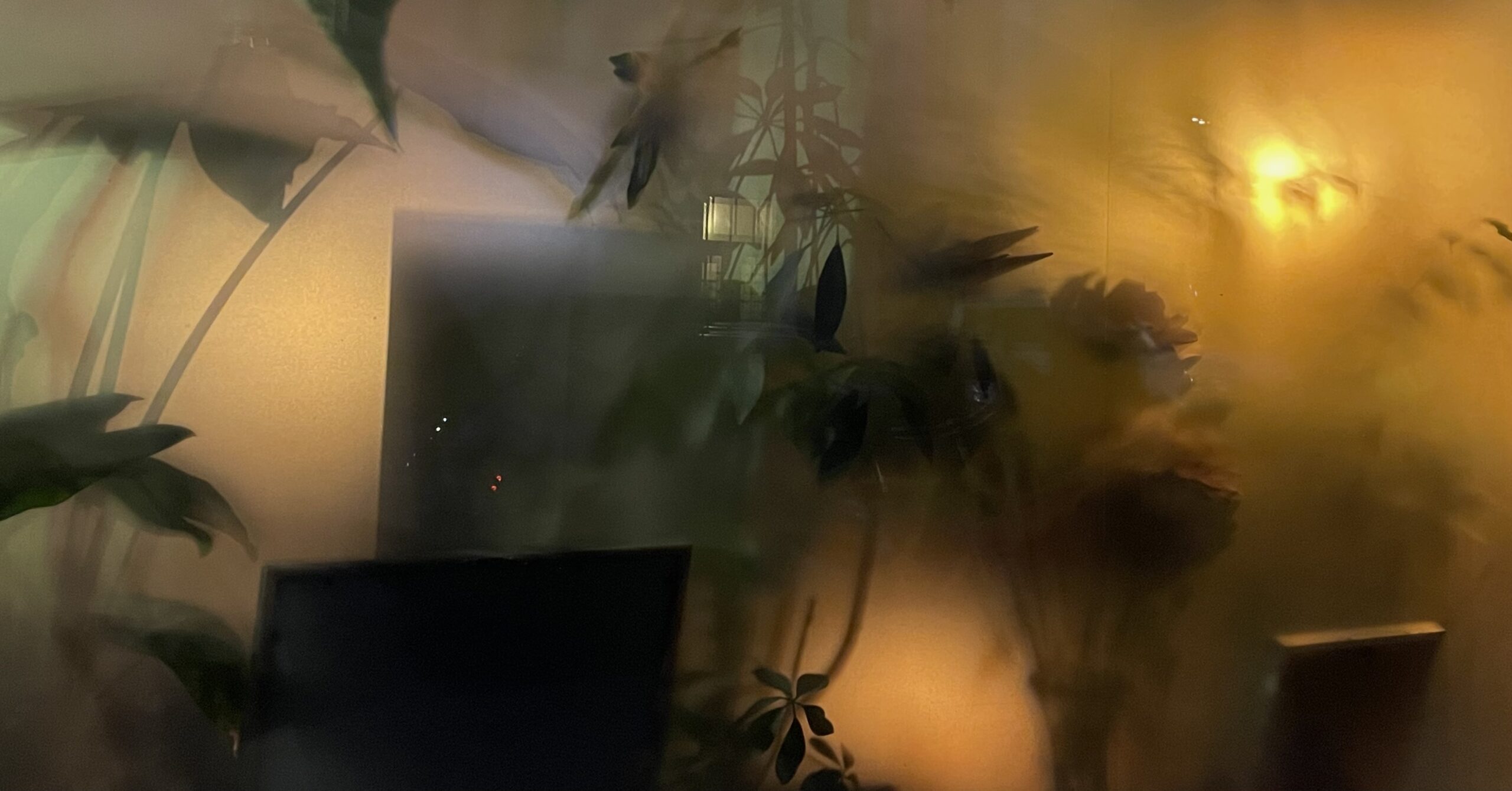It’s 10:34 pm and I am sitting on my wooden dorm-room chair. Usually, I can’t stand sitting on this box-like chair for more than five minutes, but at this moment things are different. Time, space, and mass cease to exist while I follow Ono’s instructions:
“Put your shadows together until they become one.”
(Ono)
My physical body has vanished. I’ve become mind, moving my imaginary body. I search for the shadows I’ve encountered in the past. I find shadows moving from behind my back into a parallel confrontation with myself. I walk along a road at night, streetlights guarding my sides. I find shadows defined on white walls, dancing with myself. I find shadows on changing textures, fragmented by the surface they exist on. I put them together. I try to put them together. I put them on a pile to recognize that I deserve to have a shape. I lay them on top of each other creating a body with no dimension. I don’t know how to make my shadows one.
My shadows only are because of the physicality of my body. I can only imagine my shadows because I know what a shadow is because I am more than an imaginary body. I am the experience of a shadow; I am the origin of all my shadows, I am all my shadows.
I wonder how someone/something would put shadows together.

Something without a body doesn’t have the experience of a shadow. It can tell me the theory behind putting shadows together but it is not putting them together. It cannot act physically or imaginatively. It can only recite theory and analyze meaning it cannot understand.
Something without a body – the enlightenment to my romanticism.
Someone with a body and a mind that can imagine its body is a problem, the mind-body problem, the problem of feelings, imagination, and romanticism. Someone with a body and a mind that can recognize a copy of its body is conscious. Consciousness is what makes the mind-body problem really intractable (Nagel).
Animals have a body but are they someone? Do they have a mind? Animals might have been telling us for a long time that the answer to those questions is yes, but we didn’t/don’t understand. We only understand things that are explained to us based on what we already know. Animals may have consciousness but we will recognize it as such if it does not resemble what we know: human consciousness. And that is what happened/happens.
The moment a baby looks in a mirror and recognizes itself it attains consciousness (“Mirror Test”). The baby, the human, becomes aware of its own body in the world, it realizes that its body is separate from other objects and that it can influence the world around it with its body. Once we established this recognition process as a test for human consciousness we started applying it to other beings. Land mammals, cetaceans, and even birds have passed the mirror test (“Mirror Test”). They can do something that humans can do. But those animals are still not humans and humans are still the better animals. Humans are the epitome of evolution.
Across species, we have defined consciousness as an observable behavior. Which means we inherently tied consciousness to a body. We created the mind-body problem. For many years philosophy has assumed that mind and body were two distinct processes. Scientists struggled to explain the relationship between the mind and the body. And then there was consciousness. “Without consciousness, the mind-body problem would be much less interesting.” (Nagel) “Interesting” is often used as a euphemism for “complicated”. Imagination is complicated. Feelings and romanticism are complicated.
Science seems to be turning the mind-body problem into a less complicated, explicable event. With the rise of neuroscience, the mind-body problem has been reduced to a problem of the mind. Scientific progress has shown that our thoughts and consciousness arise from the biological processes in our brains (Rowlands). Our mind is being scrutinized, fragmented, and depicted as a straightforward Venn diagram in which experiences are the overlap of sensations and propositional attitudes (Rowlands).
It’s 9:06 am and I’m having breakfast with my phone, it is one of the few things I want to communicate in the morning. Today, google suggests I read an article titled: Scientists Preparing to Turn on Computer Intended to Simulate Entire Human Brain. I open the article and advertisements flood my screen like unwanted gossip. The article says that a tech company is building an artificial brain that will be able to operate at 228 trillion synaptic operations per second, which is as fast as a human brain. Scientists believe that by building this brain we will learn to better understand the human brain (“Scientists Preparing to Turn on Computer Intended to Simulate Entire Human Brain”). Technical processes will mimic biological processes. I wonder whether this brain will have consciousness.
It’s sometime in the afternoon, or the evening, I don’t know. Time has been feeling late since winter came and the sun started to go down early. The darkness makes me tired.
I remember hearing that artificial intelligence (AI) often develops into a black box. A black box is an impenetrable system that even the creators of the AI cannot understand or don’t have access to.

We don’t know how ChatGPT is making decisions, and it cannot tell us either. Its answers are heavily curated performances lacking the authenticity of being.
Kant said that people have “an intrinsic worth”, i.e., “dignity” because we are rational agents (Rachels and Rachels). In Kant’s world, rationality means that one’s actions are in line with someone’s free will. In other words, there is no inconsistency between one’s actions and one’s free will. Kant said that animals are different from humans because they have no free will that guides their actions. This creates the following relationship between animals and humans: “[…] so far as animals are concerned, we have no direct duties. Animals . . . are there merely as means to an end. That end is man.” (Rachels and Rachels) Because animals lack free we can exploit animals in favor of our own free will.
I disagree with Kant. I don’t believe in something such as free will. I believe that everyone who thinks they have free will is lying to themselves. Believing that you have free will gives you a sense of power. Believing that humans have free will establishes a hierarchy of beings in which humans are at the very top, reigning over all other beings. Recognizing that no such thing as free will exists would entail recognizing that no being should be used as a means to an end. In addition, it would rid us of the attributes of “intrinsic worth” and “dignity” as defined by Kant.
Recognizing our lack of free will would flatten the hierarchy of beings. We would have to find a new distinguishing factor that could resemble something as free will without being free will. I advocate for consciousness as this new distinguishing factor between beings. All conscious beings should be on the same level of our worldly hierarchy and deserving of similar rights. However, establishing this new hierarchical order would entail proving the consciousness of non-human beings, and at the moment we can only do this by observing behavior and basing our observations on our definition of human consciousness.
What if something whose behavior we could not observe developed consciousness? What if we created an AI, maybe even this very artificial brain the article was talking about, and its consciousness was trapped in a black box and the AI was programmed to tell us it didn’t have a consciousness?
My eyes are heavy, and my room is cold when I fall asleep.
References
“Mirror Test.” Wikipedia, 3 Dec. 2023. Wikipedia, https://en.wikipedia.org/w/index.php?title=Mirror_test&oldid=1188130321.
Nagel, Thomas. “What Is It Like to Be a Bat?” The Philosophical Review, vol. 83, no. 4, Oct. 1974, p. 435. DOI.org (Crossref), https://doi.org/10.2307/2183914.
Ono, Yoko. Grapefruit. 2000th ed., siimon & schuster, 1964.
Rachels, James, and Stuart Rachels. The Elements of Moral Philosophy, c1986 ed., Random House, 1941, pp. 136–45.
Rowlands, M. “The Mind–Body Problem.” Encyclopedia of Consciousness, edited by William P. Banks, Academic Press, 2009, pp. 43–55. ScienceDirect, https://doi.org/10.1016/B978-012373873-8.00053-0.
“Scientists Preparing to Turn on Computer Intended to Simulate Entire Human Brain.” Futurism, https://futurism.com/the-byte/scientists-computer-neural-human-brain. Accessed 15 Dec. 2023.



